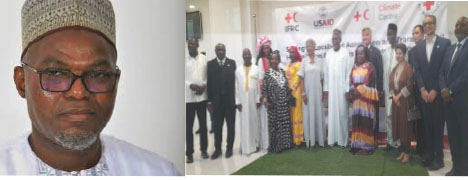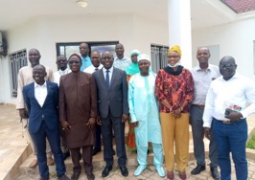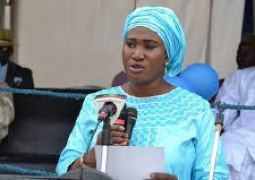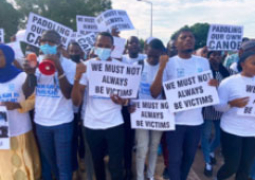
The launching, held on Friday at the Sir Dawda Kairaba Jawara International Conference Centre, was organised by the Gambia Red Cross Society (GRCS).
Scaling up Locally-Led Adaptation and Transformation Humanitarian Responses to Climate Change is the title of the two-year project funded by the United States Agency for International Development (USAID) to be executed in partnership with the International Federation of Red Cross and Red Crescent Societies (IFRC).
The transformative initiative aims to empower vulnerable communities to adapt to climate change through locally-led, integrated and multi-sectoral approaches.
According to the stakeholders, the project seeks to build sustained climate resilience at the community level and ensure transformational change across National Red Cross and Red Crescent Societies’ institutional setups, programs and operations, making them climate-smart.
The project was not just another initiative, said the vice president in launching the initiative, but a beacon of hope in the relentless fight against the devastating impacts of climate change in the country.
VP Jallow highlights The Gambia's main environmental concerns as deforestation, desertification, waste management and water pollution, and “most recently, the adverse effects of climate change”.
The Gambia has a forest cover of 480,000 hectares (about 44% of the total land area), but nearly 70% of these forests are degraded, the vice resident divulged, saying: “As a result, climate change poses a tremendous threat to the environment and natural resources of the country due to continued deforestation and forest degradation.”
The underlying driver to this concern, he stated, is the “increasing population pressure and lack of adequate socioeconomic/livelihood opportunities”.
He recounted the Gambia has been a party to the United Nations Framework Convention on Climate Change (UNFCCC) since 1994, and in 2015, ahead of the signing of the Paris Agreement, the country submitted its Intended Nationally Determined Contribution (INDC).
“The Gambia’s 2015 NDC aims to reduce emissions by 45.4% by 2030,” the VP said. “And in 2022, The Gambia submitted its Long-term Climate Change Strategy which sets out clear mitigation and adaptation targets between now and 2050.”
Also, he said, the Gambia “Government is committed to achieving a net zero emission target by 2050 within the electricity generation sub-sector.”
Talking about the weather susceptibility of the country, Fabakary Kalleh, President of the Gambia Red Cross Society, said: “the Gambia faces increased vulnerability to extreme weather events and shifting climatic patterns.
“If it is not floods, then it is drought or other climate events that lead to damaging impacts,” he cited worryingly. “We need to act now to address some of the adaptation challenges.”
He said the project is designed to ensure long-term benefits by fostering community ownership and promoting sustainable practices. The project also “contributes to USAID’s 2022-2030 Climate Strategy goals”, which aim to improve climate resilience for “500 million people” and enhance local communities’ participation and leadership in climate action by 2030.
Read Other Articles In Headlines




